We gathered the latest dating scam data and statistics for 2022 and came to the conclusion that love doesn't kill – but it may likely rob you. Keep reading and discover what types of romance frauds you should be aware of, how common they are, and what are their costs.
We also bring you some advice on how to stay safe in these turbulent high-tech times when most of our new encounters are online and difficult to discern and comprehend.
Dating scam facts and statistics in 2022
Although online romances have peaked in the last couple of years, we can't say it has been the easiest and happiest of dating times. So without further ado, let's dig into the data and facts.
1. Dating scams are the most profitable of all scams in the US
According to the Federal Trade Commission (FTC), romance scams in the US cause larger losses than any other type of scam. In 2020, dating scam losses reached a record $304 million, an almost 50% increase compared to $201 million in 2019. What's more, if we compare FTC data from 2016 to 2020, we can see that money losses caused by romance scams have increased more than four times over those four years. At the same time, the number of reports has almost tripled.
It's worth mentioning that the FTC data and FBI data aren't always in accordance. And so, the FBI reported even higher losses in 2022, a whopping $475 million.
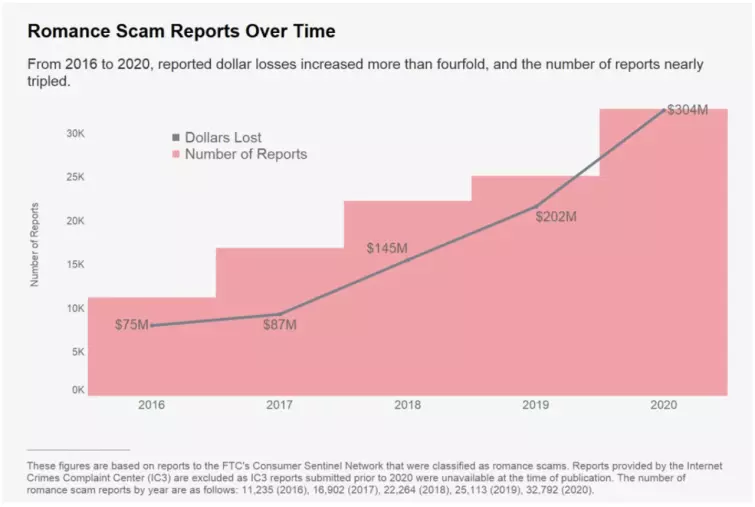
2. In 2021, reported romance scam losses were six times higher than in 2020
But if you thought that 2020 was the worst year for online dating so far, you'd be wrong. The year 2021 turned out to be even worse – almost six times worse than 2017, to be precise. The reported losses exceeded $547 million, which ended up being nearly 80% higher than in 2020.
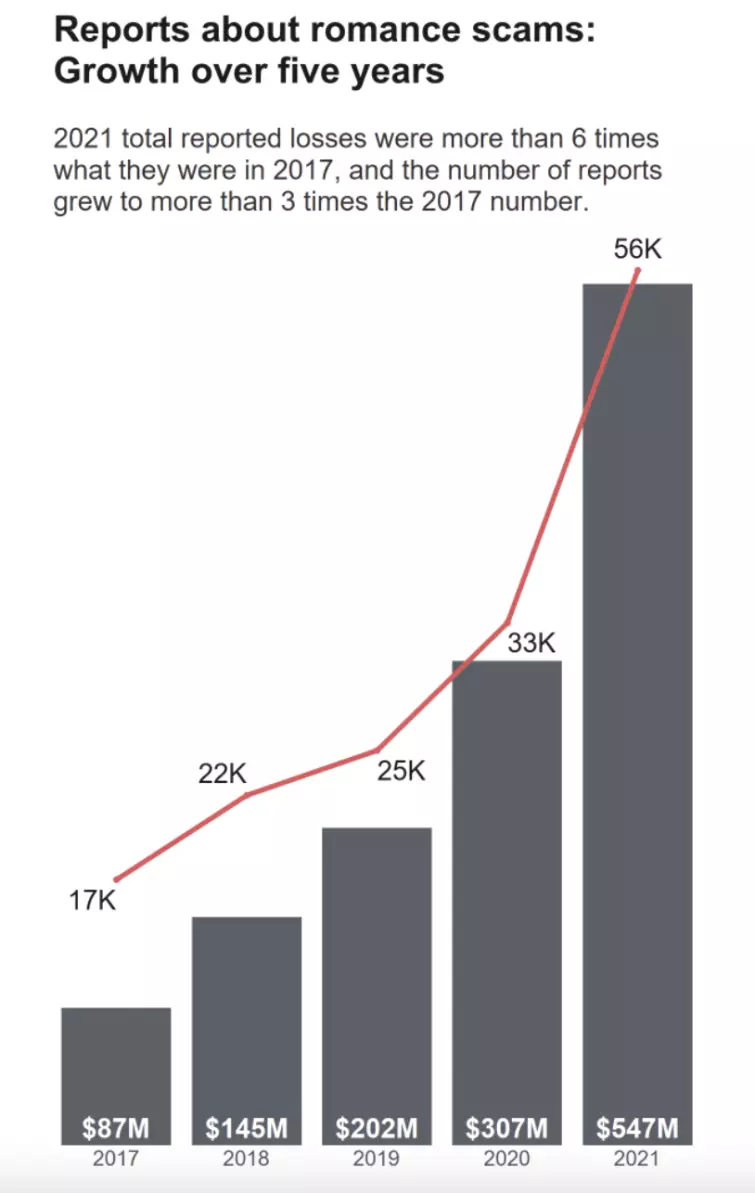
3. Nearly 60% of all online profiles may be inactive or fake
Nowadays, it can be really difficult to distinguish genuine dating profiles from fake ones. Besides, most people are unable (or don't bother) to deactivate their old dating profiles once they stop using them, which makes the whole situation even more challenging.
Some studies suggest that one in every 10 online dating profiles is fake, and the majority of them (almost 60%) could be either fake or inactive.
4. Almost one-third of all dating scams take place on social media
According to Scamwatch, out of 4,000 reported romance and dating scams in 2019 in Australia, 31.4% occurred on social media platforms and online forums. Social media romance scams also brought about the highest financial damages – over 33% of all losses, $9.1 million in total, were social media romance scam losses.
Instagram was the favorite social media platform of scammers, with 8.8% of dating scams occurring there. In the meantime, the biggest losses happened on Facebook, 7.3% of them.
5. Over 54% of dating scam victims in Australia are women
The above report also revealed that most dating scam victims in Australia are women. Female victims filed 2,165, or 54.9%, of all dating/romance scam reports, and the rest 1,707, or 43.3%, of the reports were submitted by men. Approximately 1.8% of all victims (74 reports) did not share their gender.
6. Facebook and Google Hangouts are the most popular alternative to dating apps
According to a poll that Social Catfish ran on 726 respondents, the top five most used platforms by scammers are:
- Facebook (152 people reported getting scammed on that platform)
- Google Hangouts (99 offenses)
- Instagram (80 offenses)
- WhatsApp (50 offenses)
- Plenty of Fish (50 offenses)
Plenty of Fish’s dating app shares fourth place with WhatsApp, with 50 people scammed on that platform in 2020. From this, we can see how trends are changing and that most romance scams actually occur on social media platforms, as opposed to the popular belief that dating apps are more dangerous. Some romance scammers do look up their victims on dating apps, but then they move to Facebook or Google Hangouts to solidify their profiles and avoid getting caught on those apps.
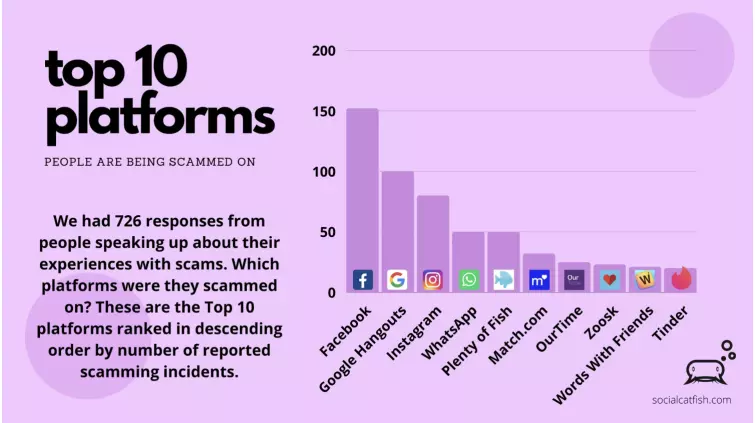
7. Most victims find the emotional loss harder to overcome than the financial loss
Overcoming the consequences of online scams is never easy, but various reports show that dating scams are usually much more traumatic to the victims than any other, mass-marketing, frauds. That's because another, personal, dimension is added, so they feel the loss more profoundly.
Romance scams are particularly devastating because not only are there financial losses, but there is also an emotional toll for the victim, which can have lasting psychological impacts on people?
According to research called The online dating romance scam: The psychological impact on victims – both financial and non-financial, most victims of this type of crime found the emotional trauma more difficult to cope with than the financial loss. Many compared it to a loss of a real-life physical relationship, and some even compared it to death.
Worse even, the posttraumatic period of these victims lasted longer. Most victims weren't able to cope with their negative experiences, especially since they were lacking understanding from family and friends, and usually had no one to talk to. Many used denial as a coping mechanism (denying the reality of the scam or identifying the fake identity with the criminal), an ineffective one, leaving them vulnerable to the same type of fraud again.
8. US seniors are particularly vulnerable to romance scams
It doesn't come as a surprise that the most senior part of our population is equally, if not more, vulnerable to various fraud types, including prize and lottery scams – due to extra time on their hands and lack of digital education (in most cases).
However, what does astound is the fact that the highest combined dollar losses in that age group in 2019 were, in fact, in the romance scam category. The US citizens above 60 reported aggregate losses of nearly $84 million on romance scams that year, making romance scams the #1 category by the height of financial losses for that age group.
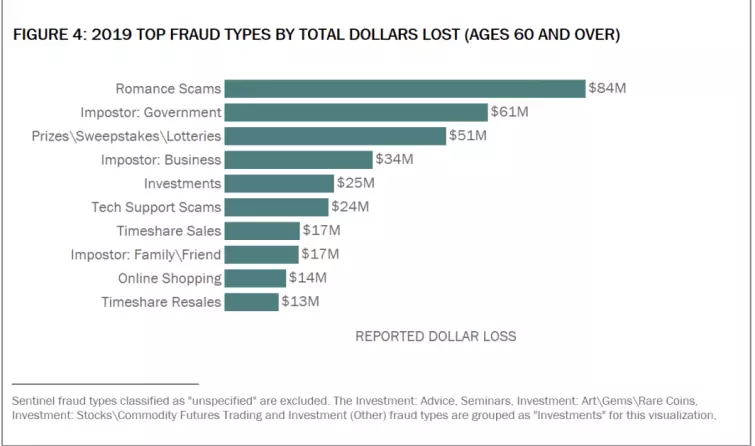
9. 69% of online dating site users are concerned about their security
Most online dating sites/apps users are concerned about their safety, but over half of them won't do anything about it. A study by ESET showed that only 29% of respondents conducted basic background checks on the people they met on dating sites (searched for them on Facebook, Google, Twitter, and similar platforms), although 69% of them admitted they felt concerned over their online safety.
The number of background searches drops furthermore with the age – only 18% of correspondents over 55 said they carry out the searches, making this group particularly vulnerable.
10. Middle-aged women are the most susceptible to romance scams
In 2019, BBC News shared the Action Fraud key findings on romance fraud, which showed that the average age of the fraud victim was 50, and 63% of victims were female. Besides, according to over 4,555 romance scam reports received that year, women lost two times more money than men. Total losses increased by 27% from the previous year. However, the results could be much higher in reality, considering that many victims choose to suffer in silence.
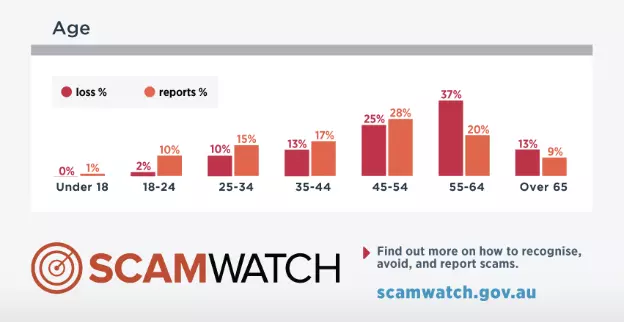
11. More than 50% of dating scam victims in the UK are women
The more recent Action fraud report shows somewhat smaller gender discrepancies with dating scams. And so, in 2020, 50% of romance fraud victims were women, 39% were men, and 11% chose not to reveal their gender.
12. Romance schemes are becoming more sophisticated and networked
As the awareness of the problem is slowly raising, so are the romance schemes becoming more and more sophisticated. Fraudsters nowadays invest a considerable amount of time and effort to create more credible fake identities, often networked across different online accounts for a more rounded back story.
So don't get deceived by the fact that someone has a Facebook, Instagram, and LinkedIn profile under the same name, and which confirms their life story. That still doesn't prove their identity is true – neither does a bank account or a bunch of other legal papers that can easily be forged.
13. Dating scams are often part of organized crime
While victims are developing strong romantic feelings for their online date, most of the time, it would never cross their mind that they are actually falling for a group scheme, or even organized crime. Unfortunately, that's very often the case.
More sophisticated fraudsters have a whole network of "associates”, presented to a victim as business partners, family members, close friends, lawyers, and such. They work in groups to achieve faster and better results, or simply strengthen their schemes.
Moreover, the perpetrators often belong to organized crime gangs. They use psychological profiling, elaborate plans, and algorithms, all to create an ideal profile (a wealthy, good-looking, and accomplished person looking for a long-term relationship) for their victim to fall in love with more easily.
14. Almost 40% of heterosexual couples in the US met online
Meeting people online is easy, convenient, and it's getting more and more popular. In 2019, 39% of heterosexual couples in the US met on the internet. In the UK, that number was still smaller around that time, with approximately one-third of romantic relationships starting online.
Some predictions say that, by the year 2031, more than half of human relationships will commence online. And where there are more cases of people finding their true love online, there's more room for "love business".
15. Potential victims are more vulnerable around Valentine’s Day
Social norms are another considerable factor in becoming vulnerable to dating scams. Approximately 52% of correspondents in an ESET study admitted loneliness around Valentine’s Day makes them more vulnerable to catfishers. What's more, 13% of them said they believed that using online dating sites/apps makes them more exposed to cybercrime.
16. Australians lost over $46 million to romance frauds in 2021
According to Reviews.org research, Australians lost $46.8 million to online dating scams in 2021, a large 20% increase from a year before. New South Wales suffered the biggest losses to romance scams – $15.2 million. Victoria was second, with $11.4 million in damage induced by romance scams, and Queensland was third, with a $6.4 million loss.
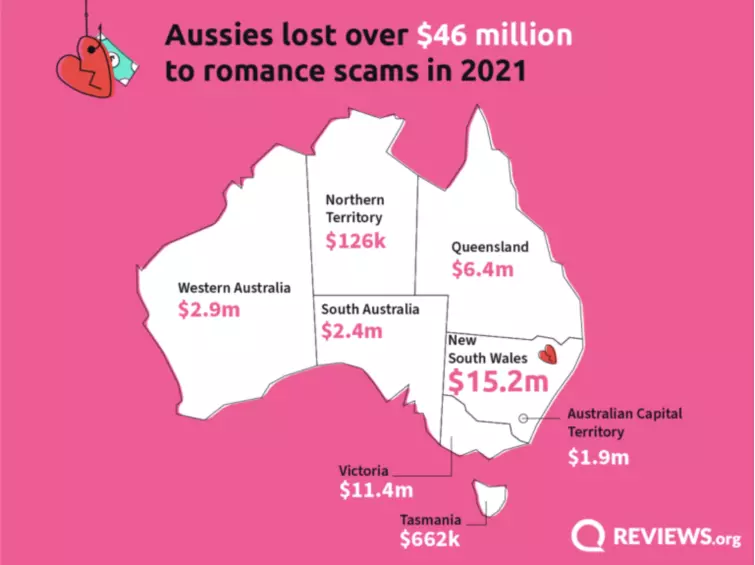
17. Most money transfers occur through bank payments and gift cards
According to Scamwatch, 33.8% of dating fraud payments get executed via bank transfers. Other payment methods include gift cards for various online platforms (Google Play, iTunes, and Steam) which take up 30.8% of total losses.
Gift cards are a particularly popular extortion method in the US, where gift card romance scams increased by 70% in 2020, according to the FTC. Victims either send gift cards by mail or provide their pin numbers for digital gift cards via online chats.
18. Money mule love schemes have peaked during the pandemic
It's not uncommon that dating scam victims unknowingly become criminals themselves. A "money mule” term is defined as a person who acts as a middle-man to receive and transfer money on behalf of fraudsters. Most of the time, they aren't even aware of what they're doing.
In 2020, money mule love schemes became more popular than ever, with criminals abusing the CARES Act for providing COVID-19 relief to conduct their frauds. The FBI reported money mule losses of over $39.2 billion across the US that year.
19. Over £68 million were lost on romance scams in the UK in 2020
Another Action Fraud report shows disheartening romance scam results for 2020 in the UK. That year, according to victims' reports, over £68 million got extracted by criminals in romance frauds. This means each victim lost £7,850 on average.
Considering that 2020 was the year when (more than ever) people turned to online dating due to COVID-19 social distancing and other restrictions, a 20% increase in bank transfers originating from dating scams doesn't surprise either.
20. Nearly one in two respondents in Southeast Asia have lost money to dating scams
Kaspersky‘s latest report shows that nearly one in two people has been a victim of dating scams in Southeast Asia in 2021. In other words, approximately 45% of respondents in the survey conducted in July of that year reported some kind of romance fraud.
The survey also shows a clear correlation between the financial damage caused by scams and the victim’s age. And so, while most of the recorded incidents cost less than $100, the majority of victims belonged to the Baby Boomers (1946-1964) and the Silent (1918-1945) age groups. Nearly 34% of the respondents of both groups suffered a financial loss in 2020.
When it comes to the higher financial damages per person (between $5,000 and $10,000), the silent generation was the one that suffered the most – in 33% of cases, the victims were people born between 1918 and 1945. Interestingly, the most common victims of online dating scams costing above $10,000 were the individuals belonging to Generation Z (those born between 1997 and 2009).
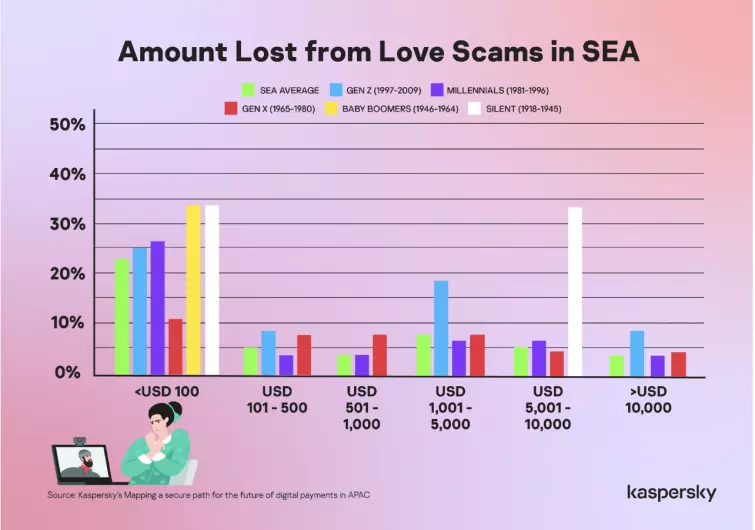
21. Catfishing followed within 12 months in 27% of cases of online dating
Fishing is still the most common attack vector with dating scams and online scams in general. Catfishing is a type of fishing scheme in which someone uses a fake identity to extract money or otherwise exploit a person.
A UK Finance study revealed that over one-quarter of respondents (27%) who used online dating sites had experienced catfishing within the last 12 months. On top of that, over one in five respondents (21%) said they either gave money, or were asked to give it, to their perpetrators.
Main dangers of online dating
As the number and frequency of dating scams are increasing, so are the reasons, or hidden motifs, behind such scams getting more and more diverse. Here, however, we've listed the most common dangers of online romances to be aware of.
- Catfishing – as mentioned above, this is a type of romance fraud where someone takes on a fake identity to impress or seduce a person in order to extort money or information from them later on. The golden rule of recognizing a catfish is – if someone seems too good to be true, they probably are.
- Money extortions – catfishing is not the only way perpetrators extract money from their online dates. They get very creative in inventing convincing heartbreaking stories to get you to send them money. It could be anything from covering their fake emergency situations to paying for their internet costs so they can continue communicating with you.
- Identity theft romance scams – sometimes a fake identity won't be served to you but snatched from you. Criminals nowadays use dating apps for personal data extortion. They will ask you many questions to get as much useful personal information for completing your profile. Once they have all the necessary info, they can use it to hack your bank accounts, take loans under your name, or even collect your tax refund.
- Online dating crypto scams – you've probably already heard of crypto scams, which became very popular in previous years. But did you know that crypto criminals nowadays go as far as targeting people on dating sites to get them to invest money in their schemes? It's all right to date someone who's very involved in crypto trading, but be careful with those who seem too eager to introduce you to the crypto trading world.
- Sextortion – is exactly as bad as it sounds. It's when your online date turns into a villain that uses your sensitive photos or videos to blackmail you for money or other favors. It goes without saying that you should always think twice before sharing sensitive visual/audio content or secrets with people you've just met online… and even afterward.
- Malvertising – some of your online dates won't be trying to get into your panties but into your computer. Their idea of sharing includes presenting you with phishing, ransomware, or malware-infected links that can steal your login credentials from various websites. These are then used for breaking into your money accounts or, again, blackmailing.
- Money mule romance scams – results of which can be devastating, as seen above in our statistics. Unknowingly, you can become a money launder for your online lover. If your online relationship is more about transferring money, gift cards, and packages than sending love, maybe you should begin to ask yourself what's the true meaning of it.
- Inheritance scams – lucky you to have caught the eye of a wealthy and handsome Dubai prince, and all you need to do is to provide a fee that will unlock an account with his countless Dirhams. Inheritance scams used to be very popular in previous years. Luckily, thanks to the media and the internet, women around the world are getting more aware and cautious.
How to avoid getting love-scammed?
Suspecting that you might be falling for someone whose intentions are not of a loving nature? Or, do you just want to scam-proof your dating and social media profiles for the future? Here are a few simple but effective steps to follow.
- Secure all your accounts – technology is everywhere around us. It makes our lives easier, it can help us grow and get stronger, or make us more vulnerable. So, make sure you utilize the security measures technology has given to us. Password managers, credit monitoring, VPNs, and 2FA for your accounts are just some of these measures. And, of course, don't forget to use strong unique passwords on all your accounts.
- Do background research – incomplete profiles with only one photo and vague job positions are some red signals you should be mindful of on dating websites. Moreover, you should never limit your research to one platform. Google the person, check their social media presence, compare photos, names, and other info. Don't worry, this won't make you a stalker or a creep. They are just basic precautionary measures.
- Trust no one – at least, until they've proven to be worthy of your trust. Usually, the people you should trust the least are the ones to insist on your trust the most. So, keep your valuable and sensitive information/photos to yourself, and don't do favors, at least until you've known the person well enough. Knowing someone online doesn't count either, you have to know them well in person too.
- Limit your exposure – sometimes you don't even need to give away your sensitive data to someone to become vulnerable because your dating/social media profile is doing it for you. Make sure this is not the case, and you aren't revealing your phone number, email address, your whereabouts, and such on these platforms.
- Stay in touch with news and trends – I always like to emphasize how staying informed helps you stay alert. Maybe what you're experiencing has already been in the news or is circling the internet, and all you needed to do to stay away from the scam is to read the right article at the right time.
Conclusion
Dating scams not only come at a high financial price but can be nerve-wracking, heartbreaking, and sometimes even lead to life-threatening situations. So, whenever you meet someone new online, it's important to remember to take it slow, stand your ground, and take all the precautions to avoid getting scammed. These include securing your accounts, performing background checks, and always, always insisting on meeting in person (at least via video chat).
We found that when people talk to someone they trust and get that gut check... it helps them avoid losing money.
Never share your sensitive personal information, let alone money or bank account details, with strangers. And remember, you're not alone, even if you feel so at the moment. For sure, there's someone in your life you can trust more than the online date you just met. Discuss your newfound online relationship with them. Maybe they can provide you with valuable advice or a reality check.
If nobody else is available at the moment, there are always the official government bodies and agencies you can speak to – both if you already got scammed or you just have a bad feeling about someone. Don't hesitate to contact them!
